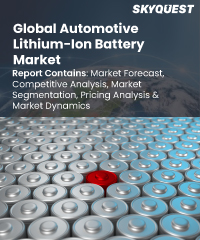
Report ID: SQMIG25A2212

Report ID:
SQMIG25A2212 |
Region:
Global |
Published Date: February, 2024
Pages:
165
|
Tables:
142 |
Figures:
78
Automotive Lithium-Ion Battery Market size was valued at USD 48.19 Billion in 2023 and is poised to grow from USD 57.3 Billion in 2024 to USD 272.13 Billion by 2032, growing at a CAGR of 18.9% during the forecast period (2025-2032).
The rising number of passenger vehicles has become a major reason for carbon dioxide outflow leading to climatic concerns. Among all metals, Lithium is the lightest due to it charges faster and thus provides high power density, and longer battery life. Having the greatest electrochemical capability Lithium-ion batteries are better than Nickle Cadmium batteries and provide stability for a longer time.
Lithium-Ion batteries have the highest energy density of any current battery technology, with energy densities ranging from 100-265 Wh/kg to 250-670 Wh/L. Moreover, Li-ion battery cells are capable of delivering up to 3.6 Volts which is thrice Nickle Cadmium battery or Nickle -Metal Hybrid Battery. Owing to these characteristics these are very low maintenance batteries and provide longer battery life without regular cyclic scheduled charging. They are capable of inducing an adequate amount of current for appliances that require high power to run. In Lithium-ion batteries, a small amount of low-Self -discharging rate is around 1-2% per month. Along with this they are con as toxic as Nickle Cadmium as cadmium is not present in these and the disposal of batteries could be easier. These factors are contributing to replacing Nickle Cadmium batteries and it is finding its application in a wide range of applications such as electric cars. Being environmentally friendly and not contributing to CO2 progression, several government initiatives are being taken to promote Lithium-Ion Batteries in Automotive, further fueling the global automotive Lithium-Ion battery market growth.
US Automotive Lithium-Ion Battery Market is poised to grow at a sustainable CAGR for the next forecast year.
Our industry expert will work with you to provide you with customized data in a short amount of time.
REQUEST FREE CUSTOMIZATIONAutomotive Lithium-Ion Battery Market size was valued at USD 40.53 billion in 2019 and is poised to grow from USD 48.19 billion in 2023 to USD 228.87 billion by 2031, growing at a CAGR of 18.9% in the forecast period (2024-2031).
Want to customize this report? This report can be personalized according to your needs. Our analysts and industry experts will work directly with you to understand your requirements and provide you with customized data in a short amount of time. We offer $1000 worth of FREE customization at the time of purchase.

Report ID: SQMIG25A2212